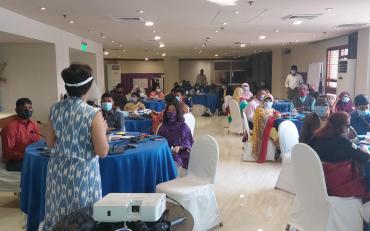March 8 - 15, 2022
The Bridge CRPD-SDGs national cycle for Bangladesh opened on International Women's day in Dhaka. Amba Salelkar, Bridge CRPD-SDGs Officer, welcomed 24 participants from 14 districts of Bangladesh on behalf of the International Disability Alliance (IDA). She noted that there were 120 applications for this national cycle, an unprecedented number so far.
The Task Team that supported this national Bridge CRPD-SDGs cycle in Bangladesh is: IDA, Transforming Communities for Inclusion (TCI), ADD International, Sightsavers Bangladesh, CBM Global and Humanity and Inclusion (HI), and this event was funded by the Inclusive Futures, Foreign, Commonwealth & Development Office (FCDO), and Light For the World.
Abdur Rakib Programme, Manager, ADD, opened the programme on behalf of the Task Team. He expressed happiness at supporting the event and seeing the diversity of the participants in the room. This Bridge CRPD-SDGs cycle has participants from organizations representing deaf-blind persons, persons with psychosocial disabilities, persons affected by leprosy, self-advocates with intellectual disabilities and indigenous persons with disabilities. There are 11 women participants.
Facilitators for this cycle included alumni of the Bridge CRPD-SDGs and its predecessor ToTAL (Training of Trainers, Advocates and Leaders) from Bangladesh and the South Asia region. The majority of facilitators were from underrepresented groups of persons with disabilities. Participants had a Braille printer and technician on-site, Bengali sign language interpretation, English and Bangla simultaneous interpretation, Bangla to English captioning, and tactile moodometer charts available at the training. Bengali translations of the CRPD and the Agenda 2030 have been provided by ADD International. Participant feedback has been overwhelmingly positive with specific reference to group activities such as the Game of Life, Access Audits and Role Plays. Participants have appreciated the diversity of participants and facilitators.
DAY 1 - Tuesday, March 8, 2022
The first day opened with an introduction to the rights-based, inclusive facilitation methodology of the training. Participants then arrived at a collective set of ground rules to work at a pace where everyone was comfortable. The agenda for the upcoming eight days was presented that included: reinforcement of the CRPD general principles, making linkages with Agenda 2030 and State obligations under the Convention, as well as brief discussions on CRPD Articles through the "two minutes-one article" exercise.
Participants celebrated International Women's Day with a special dinner organized by the Hotel for the occasion.
DAY 2 - Wednesday, March 9, 2022
The Game of Life was presented in the Bangladeshi context on day two. Participants were very vocal in their feedback about navigating different identities and the impact of intersectional identities. The game of life was followed by a dialogue on how various barriers interact with each other, where participants also shared lived experiences. Day two also delved into the concepts of inequality and non-discrimination in depth. Participants conducted an access audit of various aspects of the hotel premises in the evening.
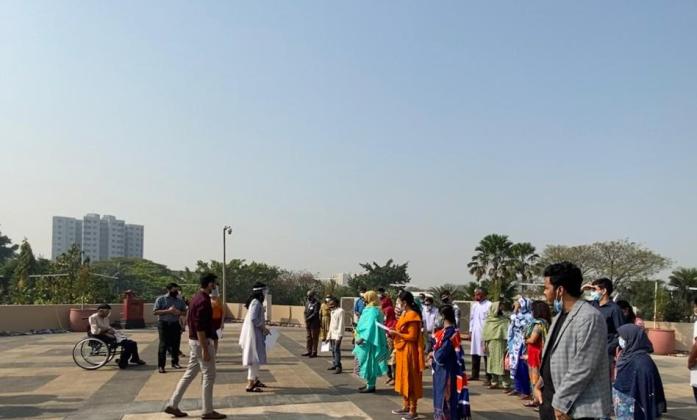
DAY 3 - Thursday, March 10, 2022
The focus of day three was on the concepts of access, accessibility and reasonable accommodation. Access was explained with a particular focus on the AAAAQ framework: Availability, Accessibility, Acceptability, Affordability and Quality. Participants found this framework useful to analyze whether they are actually able to access services on an equal basis with others.
Case studies on reasonable accommodations were given to participants, from an ATM machine not being accessible, to a hospital not having an accessible bed for giving birth, for them to consider the tests for reasonable accommodation. The participants discussed the need for both reasonable accommodation and long term systemic changes. The relationship between access, accessibility and reasonable accommodation and how reasonable accommodation is an important tool to prevent discrimination on the basis of disability was the focus of the dialogue that followed. Participants' feedback was that the topics covered for the day were relatable and interesting. Most of the participants’ dialogue involved instances from their lived experiences.
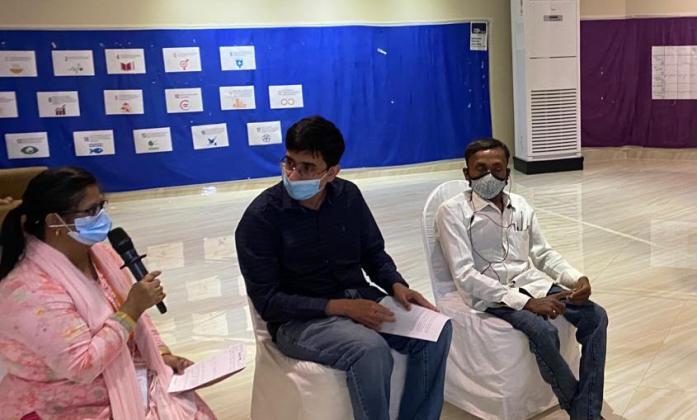
DAY 4 - Friday, March 11, 2022
After the first set of "two minutes-one article" presentations, participants spent day four learning about the Agenda 2030 and how it has included persons with disabilities through specific references as well as its inclusive language. A lively discussion, as well as a group exercise, helped participants establish linkages between the SDGs and the CRPD. Participants expressed that the interactive methodology made things very clear. This was a half-day to enable participants to rest and prepare for the rest of the training.
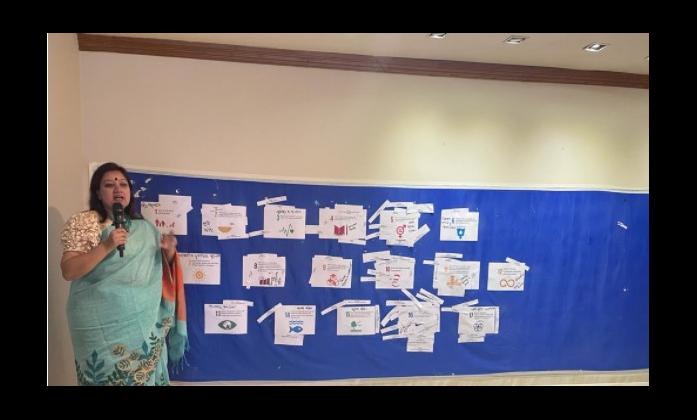
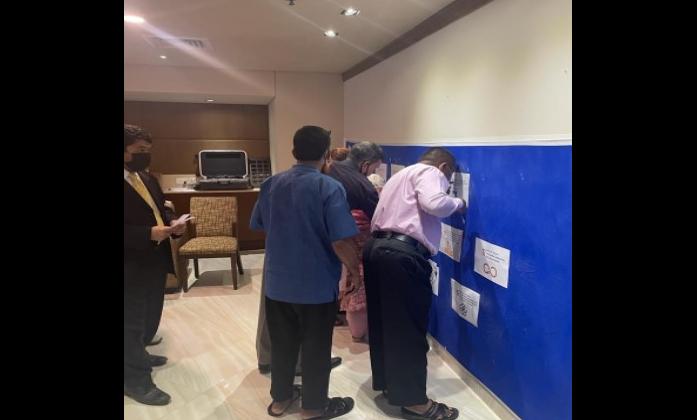
DAY 5 - Saturday, March 12, 2022
After the "two minutes-one article"exercise, day five had discussions on state obligations under Article 4 of the CRPD and an exercise on General principles. Participants reflected on the State Obligations to respect, protect and fulfil the rights of persons with disabilities enshrined in the Convention and also on the OPERA (Outcomes, Policy Efforts, Resources and Assessment) framework to analyse progressive realisation.
Participants were divided into eight groups to reflect on the General principles as a CRPD recap before taking on the mantle of facilitators themselves.
In the afternoon participants were divided into six cross-disability groups of 4 participants each for a group presentation exercise. Articles 11, 13, 19, 24, 27 and 28 were given as topics to the different groups to prepare 45-minute presentations focusing on the content of the Article, links with the SDGs and other CRPD Articles as well as using OPERA and AAAAQ to analyse the situation on the ground, existing policy initiatives, resources, stakeholders and tools to implement the article.
Other discussions on day four involved deinstitutionalization and Article 31, particularly the methodological differences in models of data collection and the need for comparable, reliable and disaggregated data to know how disability rights are being implemented.
DAY 6 - Sunday, March 13, 2022
The "two minutes-one article" presentations picked up steam with presentations by participants that encouraged a lot of discussions. This was followed by the 45 minute presentations by the groups, that was followed by feedback from the facilitators.
The presentation on inclusive education emphasised on how learners with disabilities face the highest risk of exclusion and how the Convention addresses this. For instance: for a deaf-blind learner, having a school in the community does not necessarily make education available, and also, the participants discussed acceptable forms of education and universal design.
For the presentation on access to justice, participants looked at persons with disabilities accessing the justice system both as victims and as people who might face judicial action against them and reflected on the impact of corruption in systems. They spoke about the prison system in Bangladesh and how access to justice requires all age-appropriate procedural accommodations.
In the presentation on work and employment participants addressed questions of assumption of capacity and incapacity - whether certain groups could do all jobs and talked about non-discrimination, reasonable accommodation as well as equal pay.
Day 7 - Monday, March 14, 2022
On day seven, the "two minutes one article" presentations were followed by the final "45-minute - 1 article" presentations on independent living and inclusion in the community (Article 19), situations of risk and humanitarian emergencies (Article 11) and social protection (Article 28).
With regard to Article 11, the group presented the experience of persons with disabilities with regard to situations of risk and disasters in Bangladesh as well as with regard to the refugee situation. They also briefly presented the IASC Guidelines on Inclusion of Persons with Disabilities in Humanitarian Action.
On Article 28, participants presented the concept of disability-related extra costs, and the role social protection has in ensuring the full enjoyment of the right to life, as well as an AAAAQ analysis on the existing social protection for persons with disabilities in Bangladesh.
On Article 19, participants also went into some of the issues raised in the General Comment No. 5, while also engaging in a role-play exercise to highlight some of the issues confronted by persons with disabilities in Bangladesh and their rights. Participants also spoke about how equal recognition before the law meant that people with disabilities have the right to take legally binding decisions.
Other discussions of the day were on the concept of independence, the different kinds of support required to make decisions, as well as the safeguards to ensure there is no abuse to persons with disabilities.
After the presentation on Article 8 of the CRPD for the "two minutes - one article" activity, a lively dialogue on disability as part of human diversity, the realities of negative portrayal of persons with disabilities in Bangladeshi media, and state obligation not to perpetuate stereotypes and wrong and/or outdated terminologies about persons with disabilities followed.
The day ended with an explanation of the policy paper requirement and encouraged participants to start thinking about the subject of their choice.
DAY 8 - Tuesday, March 15, 2022
Day eight marked the last day of module one of Bridge CRPD-SDGs for the Bangladesh National Cycle module one. All remaining participants presented their “two minutes-one article” presentation on the last day. Discussions focused around the right to health, and the right to accessible communications.
The last day was focused around addressing questions collected from the hotbox and parking lot which were answered by the facilitators. Questions included monitoring committee for CRPD in Bangladesh and the imbalance in power and funding between OPDs and INGOs, and the need for capacity building exercises available to OPDs to develop skills for writing concept notes and project proposals.
The last day of Bridge also seeks to reinforce the cross disability movement. Participants were divided into groups to build together the stable house possible with straws; each group was given an equal number of straws for this purpose. The idea was for everyone to have the same resources and for them to ensure that everyone was included in the activity, despite the diversity of impairments in the group. After the activity, each group discussed the different strategies and skills they used. In the lunch break, participants visited the on-site braille technician who explained how the facility worked for participants who had not experienced it before.
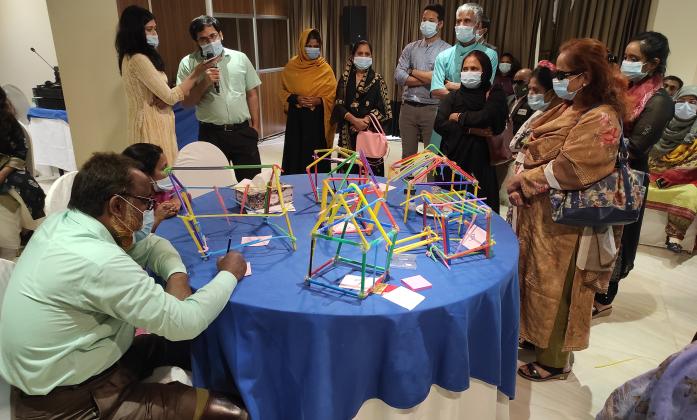
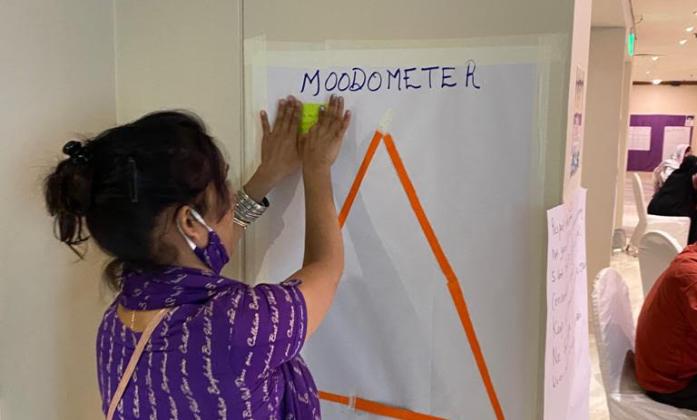
Over the course of eight days of training, many collaborative and accessible activities, from the game of life, individual presentations for the "two minutes- one article" exercise, substantive 45-minute presentations, group activities, frequent energizers (often led by participants), and case study analysis were conducted. Each day ended with a feedback session and documenting moodometers. During the training, there were some important discussions around social protection, political participation, cultural rights, evolution of rights, moving away from the medical model and towards the human rights-based approach to disability rights. At the end of the training, participants filled out feedback forms and noted that being part of the training had significantly improved their understanding of CRPD and that they were also able to make linkages to SDGs. Many participants expressed that although Bangladesh had ratified UNCRPD in 2008, they were learning about it in detail only with this training after fourteen years.
Participants ended with revisiting their ‘ranking charts’ to place their confidence on aspects of the training and expressed that their expectations of learning about the UNCRPD and its linkages with SDGs were met. In the final feedback interviews, participants acknowledged the accessibility of the various activities and materials used in the training. They expressed that these arrangements created opportunities for participants with different types of disabilities to actively engage and collaborate with each other throughout the training.
Additional resources:
- Agenda in English and Bengali
- List of participants
- Call for applications
